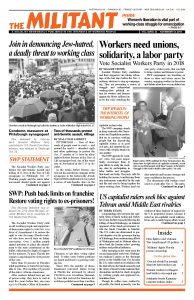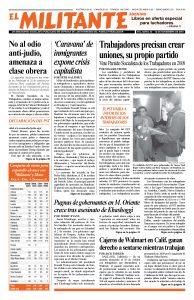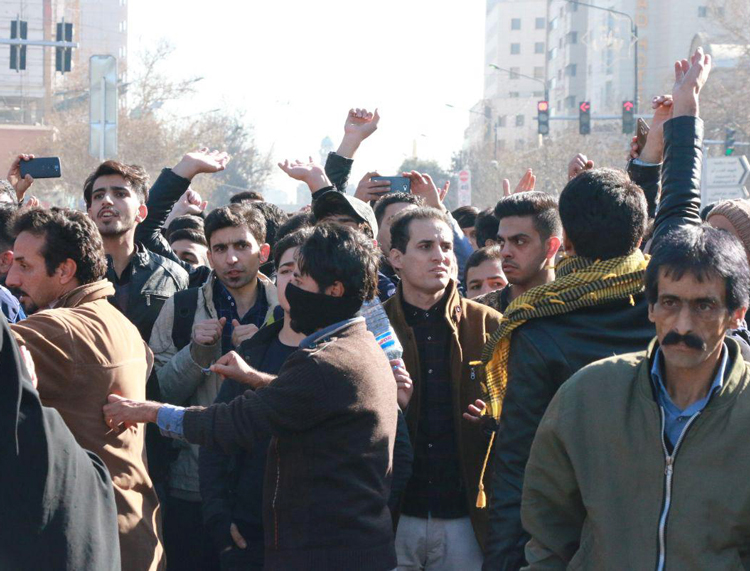Longstanding rifts between the capitalist rulers of Saudi Arabia and Turkey have been further exposed following the killing of Jamal Khashoggi, an Islamist opponent of the Saudi government, inside the Saudi Consulate in Istanbul. The U.S. rulers are determined to prevent disputes over the gruesome slaying of Khashoggi from undermining efforts of Washington and its Mideast allies to drive back the Iranian rulers’ growing military and political influence.
After emerging as the victor from the second imperialist world war, Washington replaced London as the dominant power in the Middle East. For decades the U.S. rulers relied on its relations with the shah of Iran, the Saudi monarchy and the rulers of Israel to help maintain their domination and hold in check struggles by working people and oppressed nationalities there.
Though its coffers were swelled by oil profits, the Saudi monarchy was the weakest of these bastions of support for the U.S. propertied owners, because it rested on pre-capitalist social relations. It has only recently begun efforts to end its dependence on oil rents and drive forward industrial development and trade.
Washington’s domination of the region was dealt a huge blow in 1979 when revolutionary mobilizations of working people in Iran overthrew the hated tyranny of the shah. The capitalist class salvaged its rule through a counterrevolution carried out by the cleric-led regime, but it was never able to put a stop to working-class resistance. Washington has never replaced the shah as a stable bulwark of its interests in the region.
The U.S. rulers — mistakenly believing they “won” the Cold War when the Soviet Union imploded in 1991 — have since waged a series of wars that furthered the breakup of the imperialist order in the region. They backed the Saddam Hussein government of Iraq in its bloody but unsuccessful invasion of Iran in the 1980s, then waged two wars against the people of Iraq, eventually overturning Saddam’s rule in 2003, and are now embroiled in the seven-year-long civil war in Syria.
This conflict — which grew out of a popular rebellion that was put down in blood by the dictatorial Syrian regime of Bashar al-Assad — created a vacuum that the reactionary Islamic State stepped into, drew in Moscow’s forces and air power, and opened the door to Tehran’s expanded reach. It also created space for the rise of the Kurdish national struggle in Syria and across the region.
Today Washington is seeking to shore up a broader alliance to drive the Iranian rulers’ military forces and Tehran-backed Islamist militias out of Syria and Iraq.
These developments are part of broad shifts in world politics unfolding today that are busting apart the institutions and alliances that have marked our lifetimes. NATO, the U.N., related groups like the World Court, the European Union are all fraying at the seams.
Challenges to US rulers’ sway
In this context, the U.S. rulers see growing challenges to their sway, particularly by the explosive economic expansion by the bosses in China. But Washington remains the dominant world capitalist power — economically, politically and militarily. The Pentagon has some 54,000 troops deployed in military bases across the Mideast, along with hundreds of bombers and jets and a substantial naval fleet.
The U.S. Navy boasts 20 aircraft carriers. By contrast, the U.K., which the U.S. replaced as the dominant sea power, has two. Berlin, the strongest capitalist power in Europe, has zero. Beijing and Moscow each have one. And Moscow’s Admiral Kuznetsov carrier, which had been used to shell rebels in Syria, was damaged Oct. 30 during repairs in Murmansk.
Conflicts between the Saudi and Turkish rulers have intensified in recent years. Khashoggi was an ally of Ankara and a defender of the Muslim Brotherhood, a bourgeois, Islamist current that has won some support across the Mideast after the discrediting of Arab nationalist and Stalinist parties over decades. He shared a common political perspective with Turkish President Recep Tayyip Erdogan — rebuilding a Middle East power like the former Ottoman Empire. Erdogan proclaims Turkey is “the only country that can lead the Muslim world.”
‘Triangle of evil’
This clashes with the perspectives of the Saudi ruling family. Crown Prince Mohammed bin Salman has derided Erdogan’s government as part of a “triangle of evil” alongside Tehran and the Islamic State.
Both Ankara and Riyadh have expanded their military intervention in the region, especially in Syria, as they jostle for political and economic influence. The Saudi rulers have deepened their relations with Washington, while the Turkish rulers have increasingly come into conflict with the U.S. rulers, especially over the Kurdish national question and increased collaboration with Moscow.
While the Saudi rulers have sought to stifle the influence of the Muslim Brotherhood across the region, including banning it at home, the Turkish rulers have supported the group.
Sanctions targeting the Iranian Revolutionary Guard and the extensive business empire it controls were adopted by Washington Oct. 16. Far more extensive sanctions on Iran will go into effect Nov. 5, as the U.S. rulers seek to force Tehran into new negotiations. Governments around the world, including those that oppose Washington’s measures, feel compelled to comply with them, and are largely doing so. Beijing announced it will halt its oil purchases from Iran.
The impact of the sanctions will fall hardest on working people, who face mounting deaths and suffering from the impact of wars Tehran has waged in Syria and Iraq. The price of milk has doubled since last year and tomatoes have gone up fivefold.
The Iranian rulers faced widespread working-class-led protests against these wars earlier this year, as well as recent protests across southern Iraq demanding an end to Tehran’s political and military intervention across the region.
Teachers in several Iranian cities organized a 48-hour strike Oct. 14-15, Kurdistan 24 news channel reported, demanding higher pay, the release of imprisoned unionists and the right to teach in Kurdish and other languages spoken across the country.


